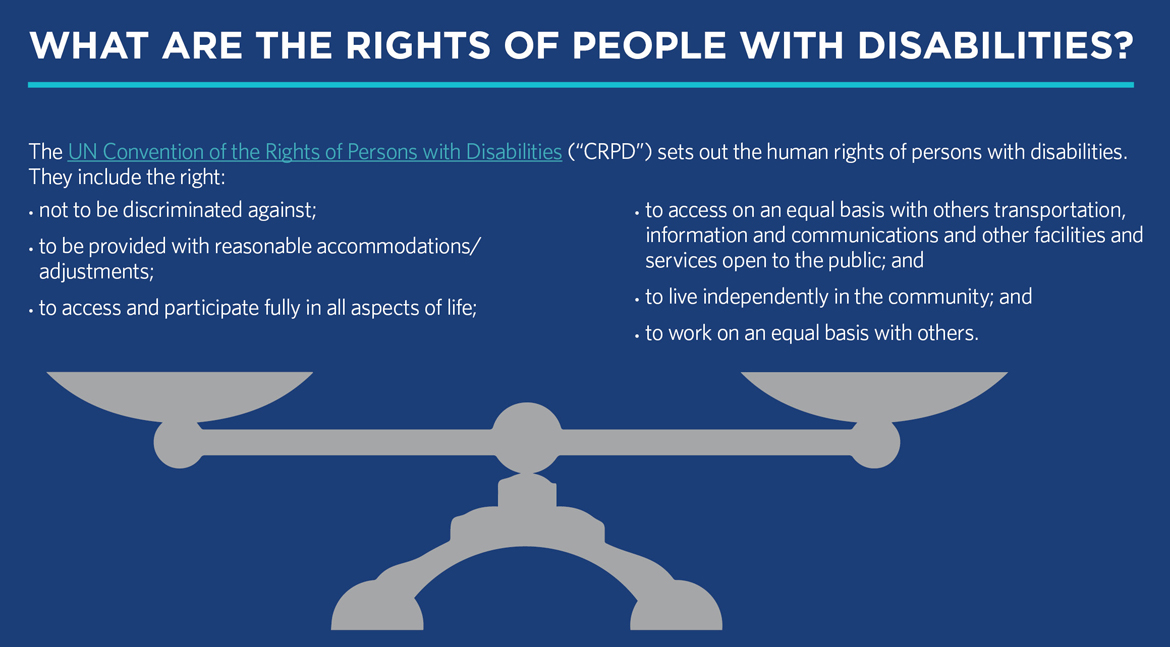As companies increase their efforts to comply with the UN Guiding Principles on Business and Human Rights ("UNGP"), the International Day of Persons with Disabilities on 3 December 2017 provides an opportune time for a business to reflect on its efforts to respect and promote the human rights of people with disabilities, as part of their broader business and human rights efforts.
In particular, a business should consider whether it fully understands the legal framework in this area and the rights of people with disabilities? What actions should be taken in relation to employees, consumers and other counterparties with disabilities?

Parties to CRPD are required to promote, protect and ensure the full enjoyment of human rights by people with disabilities. The CRPD is the most recent human rights treaties, and was one of the most quickly and widely ratified international treaties. It has 160 signatories to date including the UK, the EU, China, Canada and Australia.
How does the CRPD fit within the UNGP framework?
The UNGPs provide that businesses have a responsibility to respect internationally recognised human rights. In particular, they must act with due diligence to avoid infringing on the rights of others and to address adverse impacts which they are involved. The responsibility exists over and above compliance with national laws and regulations.
"Internationally recognised" human rights refer to, at a minimum, the International Bill of Human Rights and the eight core conventions of the International Labour Organization. However, depending on the nature of a business' operations, it might also need to consider additional human rights standards. This is the case if the business' activities could pose a risk to the human rights of individuals belonging to specific groups or populations that face specific challenges and require particular attention. This includes people with disabilities.
Therefore, if a business' activities may pose a risk or have adverse impacts on people with disabilities, it is required to integrate the principles and standards in the CRPD in its efforts to comply with the UNGPs.
what specifically should companies do?
As part of a business' human right due diligence processes, it should assess and identify whether its activities may have adverse impacts on people with disabilities. If such a risk is identified, the business should closely consider and incorporate the human rights of people with disabilities when:
- making its human rights policy commitment and embedding the policy in its systems and process;
- undertaking its continued human rights due diligence processes and procedures to prevent, mitigate and account for how they address their adverse impact on the rights of people with disabilities; and
- providing for, or cooperating in, processes to provide remedies.
Consumers
People with disabilities are active consumers and economic actors in their own right. Companies, at the earliest stage in the design of their product/services lifecycle, should factor in disability. Having accessible goods and services serves to enhance the status of persons with disabilities as active consumers, and grows market share for businesses.
For example, a transport company ought to consider whether the transport they provide is accessible and can be fully enjoyed by people with disabilities (including, but not limited to, people with physical disabilities). Similarly, a business that provides consumer products should consider whether its products and stores are accessible; and a housing or accommodation provider should consider whether people with disabilities have full access to their homes. These considerations go beyond assessing whether there are any physical barriers to access; it also includes identifying other, more subtle barriers to participation, such as attitudes of staff members, as well as communication and policy barriers.
Employees
A business should also reflect on its employment of people with disabilities and their inclusion in its global workplaces and supply chains – this may include identifying and mitigating barriers to employment and creating clear and measurable employment pathways and leadership opportunities for people with disabilities.
The ILO has developed useful guidance and tool kits, as well as establishing an ILO Global Business and Disability Network. There are also many national forums for business-to-business cooperation around building “disability smart” companies, such as the Business Disability Forum in the UK and the Australian Network on Disability.
Best practice
Companies should remember that their responsibilities are not limited by the laws of the particular countries they operate within. If national laws fall short in providing adequate protection for people with disabilities, a business should operate to the higher standard set out in the CRPD. A business cannot simply rely on compliance with national anti-discrimination, equality and health and safety laws. Rather, it should adopt a "best practice" approach and use the influence that it has to ensure that the rights of people with disabilities are protected and respected.
As is the case with human rights due diligence generally, disability inclusion should not be seen as a one-off activity. The aim should be that disability inclusion is embedded in the organisation’s culture and reflected in all its policies and activities.
This post was written in conjunction with Emily Cukalevski. Emily is a Herbert Smith Freehills Associate, currently on a leave of absence studying a LLM in International & Comparative Disability Law & Policy at the National University of Ireland, Galway.
Legal Notice
The contents of this publication are for reference purposes only and may not be current as at the date of accessing this publication. They do not constitute legal advice and should not be relied upon as such. Specific legal advice about your specific circumstances should always be sought separately before taking any action based on this publication.
© Herbert Smith Freehills 2025
Stay in the know
We’ll send you the latest insights and briefings tailored to your needs
